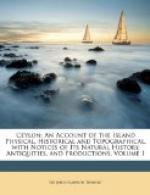Square Miles Square Miles Length of Embouchure. drained in drained in the Course of Mountain low Country, the main Zone. about Stream.
Mahawelii-ganga near Trincomalie 1782
2300 134
Kirinde at Mahagan 34
300 62
Wellawey near Hambangtotte 263
500 69
Neivalle at Matura 64
200 42
(Three Rivers) near Tangalle 56
200
Gindura near Galle 180
200 59
Kalu-oya at Caltura 841
300 72
Kalany Colombo 692
200 84
The Kaymel or
Mahaoya near Negombo
253 200 68
Dederoo-oya near Chilaw 38
700 70
----------------------------
4212
5100
[Footnote 1: See ante, p. 12, for a definition of what constitutes the “mountain zone” of Ceylon.]
In addition to these, there are a number of large rivers which belong entirely to the plains in the northern and south-eastern portions of the island, the principal of which are the Arive and the Moderegam, which flow into the Gulf of Manaar; the Kala-oya and the Kanda-lady, which empty themselves into the Bay of Calpentyn; the Maniek or Kattragam, and the Koombookgam, opposite to the Little Bass rocks and the Naveloor, the Chadawak, and Arookgam, south of Batticaloa. The extent of country drained by these latter streams is little short of thirteen thousand square miles.
Very few of the rivers of Ceylon are navigable, and these only by canoes and flat-bottomed paddy boats, which ascend some of the largest for short distances, till impeded by the rapids, occasioned by rocks in the lowest range of the hills. In this way the Niwalle at Matura can be ascended for about fifteen miles, as far as Wellehara; the Kalu-ganga can be traversed from Caltura to Ratnapoora; the Bentotte river for sixteen miles to Pittagalla; and the Kalany from Colombo to the foot of the mountains near Ambogammoa. The Mahawelli-ganga is navigable from Trincomalie to within a short distance of Kanda[1]; and many of the lesser streams, the Kirinde and Wellawey in the south, and the Kaymel, the Dedroo-oya, and the Aripo river on the west of the island, are used for short distances by boats.
[Footnote 1: For an account of the capabilities of the Mahawelli-ganga, as regards navigation, see BROOKE’S Report, Roy. Geog. Journ. vol. iii. p. 223. and post, Vol. II. p. 423.]




